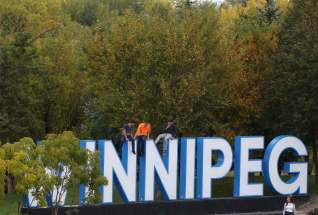Plan for rapid transit needs data, not platitudes
Read this article for free:
or
Already have an account? Log in here »
To continue reading, please subscribe:
Monthly Digital Subscription
$0 for the first 4 weeks*
- Enjoy unlimited reading on winnipegfreepress.com
- Read the E-Edition, our digital replica newspaper
- Access News Break, our award-winning app
- Play interactive puzzles
*No charge for 4 weeks then price increases to the regular rate of $19.00 plus GST every four weeks. Offer available to new and qualified returning subscribers only. Cancel any time.
Monthly Digital Subscription
$4.75/week*
- Enjoy unlimited reading on winnipegfreepress.com
- Read the E-Edition, our digital replica newspaper
- Access News Break, our award-winning app
- Play interactive puzzles
*Billed as $19 plus GST every four weeks. Cancel any time.
To continue reading, please subscribe:
Add Free Press access to your Brandon Sun subscription for only an additional
$1 for the first 4 weeks*
*Your next subscription payment will increase by $1.00 and you will be charged $16.99 plus GST for four weeks. After four weeks, your payment will increase to $23.99 plus GST every four weeks.
Read unlimited articles for free today:
or
Already have an account? Log in here »
Hey there, time traveller!
This article was published 13/02/2020 (2128 days ago), so information in it may no longer be current.
Whatever options Winnipeg Transit ends up choosing to improve bus service – including the possibility of building new Bus Rapid Transit lines – it should be based on a well-researched, cost-benefit plan. That’s something that was never done for the Southwest Transitway.
Transit is working on a new master plan that will provide details on what plans, if any, there are to build more rapid transit lines in Winnipeg. Hopefully they will do the necessary due diligence this time before moving ahead with any major capital project.
Bus Rapid Transit in Winnipeg has always been more about political fashion than evidence-based policy making.
When questions were asked in the early planning stages of the Southwest Transitway about how much faster and more reliable it would be compared with existing express buses, Transit could never satisfactorily answer.
It was an important question from a cost-benefit perspective. The public wanted to know whether spending a half-billion dollars on a dedicated bus line was worth the money, compared to spending those dollars in other areas of transit to improve speed and reliability.
But that information was never forthcoming. Even today, when we ask for the comparisons between speed and reliability of the former Pembina Highway express buses (which were cancelled in 2015 by Transit after Phase 1 of the transitway opened) and the new Transitway, Transit doesn’t have the data readily available.
“Providing travel times for routes prior to 2015 would require a FIPPA (a formal access to information request) because that data is archived on tapes downtown that would have to be manually located and watched,” a transit spokesperson said in a November email, in reply to a Free Press request.
Had Transit done its due diligence during the planning stages of its first BRT line, by comparing existing travel times and delays with projected ones under BRT, that data would be contained in a report that could be shared publicly. But it doesn’t exist because that due diligence was never done.
What Transit does have are comparisons between Route 160 (Phase 1 of Transitway) and Route 60, a regular Pembina Highway bus.
That data shows that in 2018, Route 160 was four to eight minutes faster and more reliable than the regular No. 60 bus during afternoon p.m. periods (the differences were smaller for morning peak periods). Once Phase 2 opens in April, those numbers are expected to improve further.
What Transit can’t tell us is how those travel times compared to the former Pembina express and super express buses, which no longer exist. Which means they never did a full cost-benefit analysis to show whether spending $559 million on the Southwest Transitway was worth the money.
Could those dollars have been spent in other areas of Transit – more buses, greater frequency, improved scheduling – to provide a greater benefit than the Transitway will produce? We’ll never know because that opportunity cost was never calculated.
Whatever is being proposed should be compared with what exists now, and what improvements could be made to on-street buses, including adding greater capacity.
City hall is already showing signs that it’s learning from those past mistakes. More recent plans for future BRT lines may see more regular buses on streets and fewer on dedicated busways.
Why? Because spending hundreds of millions of dollars on dedicated busways is expensive and can only be justified if it substantially improves travel times and reliability.
If the benefits are only marginal compared to what could be achieved with more frequent on-street buses and better scheduling (like the spine-and-feeder routes planned for Pembina Highway), it may not be worth the money.
In order to figure that out, a detailed cost-benefit analysis is required. Whatever is being proposed should be compared with what exists now, and what improvements could be made to on-street buses, including adding greater capacity.
To do that, city hall has to move past the fashion politics of BRT (wanting rapid transit just for the sake of it) and engage in evidence-based decision making.
Everyone wants better transit, not only for those who already use it but to encourage more people to leave their cars at home and take the bus. Improved transit reduces traffic congestion, wear and tear on the roads, and greenhouse gas emissions.
The return on investment from a well-funded, properly managed transit system is substantial. But it has to grow intelligently.
Decisions on how to expand transit have to be made based on evidence, not political platitudes.
City hall is slowly coming to that realization.
tom.brodbeck@freepress.mb.ca

Tom has been covering Manitoba politics since the early 1990s and joined the Winnipeg Free Press news team in 2019.
Our newsroom depends on a growing audience of readers to power our journalism. If you are not a paid reader, please consider becoming a subscriber.
Our newsroom depends on its audience of readers to power our journalism. Thank you for your support.














